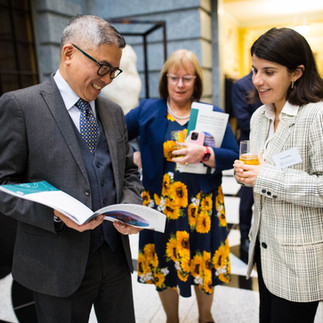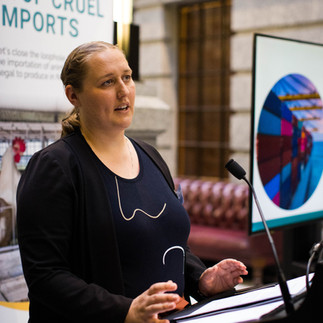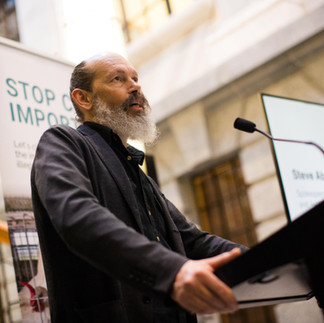API report launch event in NZ Parliament on navigating the practical aspects of a fair import policy
- Romy Gelber
- Oct 23, 2025
- 3 min read
On 21 October, Members of Parliament, government officials, industry and NGO representatives met at a Parliamentary reception for the launch of our new report, ‘Vision into Action: Applying Animal Welfare Standards in Import Policy’, exploring the practical implications of applying New Zealand’s animal welfare standards to imports.
Hosted by National MP Barbara Kuriger who is a former dairy farmer and Deputy Speaker of the House of Representatives, the event highlighted the importance of upholding New Zealand’s commitment to animal welfare by extending New Zealand welfare standards to imported products via unilateral legislation.
In her speech, Barbara emphasised the public expectation of consistent standards: "Most New Zealanders would expect that any food that we're eating in this country would apply to those [animal welfare] standards… The proposed policy is about the fairness of trade and ensuring lower welfare production is not simply outsourced overseas." She called for a pragmatic approach to the issue, adding, "I call on Members of Parliament to have a good common sense discussion here… what I would welcome tonight is a really serious discussion about what we can do with this."

Other speakers from across the political spectrum underscored the report's significance, including Labour MP and Spokesperson for Trade, Damien O’Connor and Green MP and Agriculture and Animal Welfare spokesperson Steve Abel, international trade lawyer and expert Tracey Epps, Walt Cavendish a Waikato dairy farmer and George Bridgwater, Policy Advisor from Animal Policy International.
In her speech, international trade lawyer Tracey Epps addressed concerns about WTO compliance, explaining how this measure is compatible with New Zealand’s international obligation under the WTO’s ‘public morals’ exemption. Tracey explained that there is clear evidence from public polling and research that implementing this policy is necessary for protecting public morals in New Zealand on animal welfare grounds.
Labour MP Damien O'Connor offered a nuanced perspective on the proposal, acknowledging both opportunities and considerations that would need to be addressed by trade negotiators. Looking ahead to potential policy consideration, he concluded, "This is a good report that will be considered by the Labour Party... We will consider this very carefully."

Green MP Steve Abel called on Members of Parliament to support the Animal Products (Close the Welfare Gap) Amendment Bill, which he tabled in May of this year. The Bill would give the Minister the ability to set animal welfare standards for all animal products sold in New Zealand, and require them to apply New Zealand’s standards to imported pork and eggs in the first two years.
He encouraged cross-party support for the Members Bill, saying, "We have the ability to get the signatures, to get the Bill out of the biscuit tin, and bring it to a Select Committee and really prosecute the value of that bill through a proper, thorough Select Committee process. So I certainly invite all of my colleagues in the House to join me in signing that bit of paper."
Waikato dairy farmer Walt Cavendish spoke passionately about the importance of a level playing field for New Zealand farmers: "Sow stalls and battery cages are long gone from here, but the products we import, ladies and gentlemen, don't always play by the same rules, and that's just not right. 'Vision into Action' proves that closing that welfare gap isn't just the ethical thing to do, it's practical, affordable and good for New Zealand".
George Bridgwater, Policy Advisor for Animal Policy International, presented the key findings from the 'Vision into Action' report, demonstrating that extending New Zealand's animal welfare standards to imports is both practical and economically viable. He shared data showing that pork exports to New Zealand represent less than 2% of exporters' total production, with major suppliers like the United States, Canada, Spain and Australia already producing far more welfare-compliant products than needed for the New Zealand market.
Speeches were followed by a lively Q&A session, where George and Tracey answered questions from attendees on specific aspects of implementation, economic implications and legal considerations.
Read the full report, an article about the report publication and media release.
Thank you to Dianna Thomson for the event photos. See all photos on Flickr.


































































